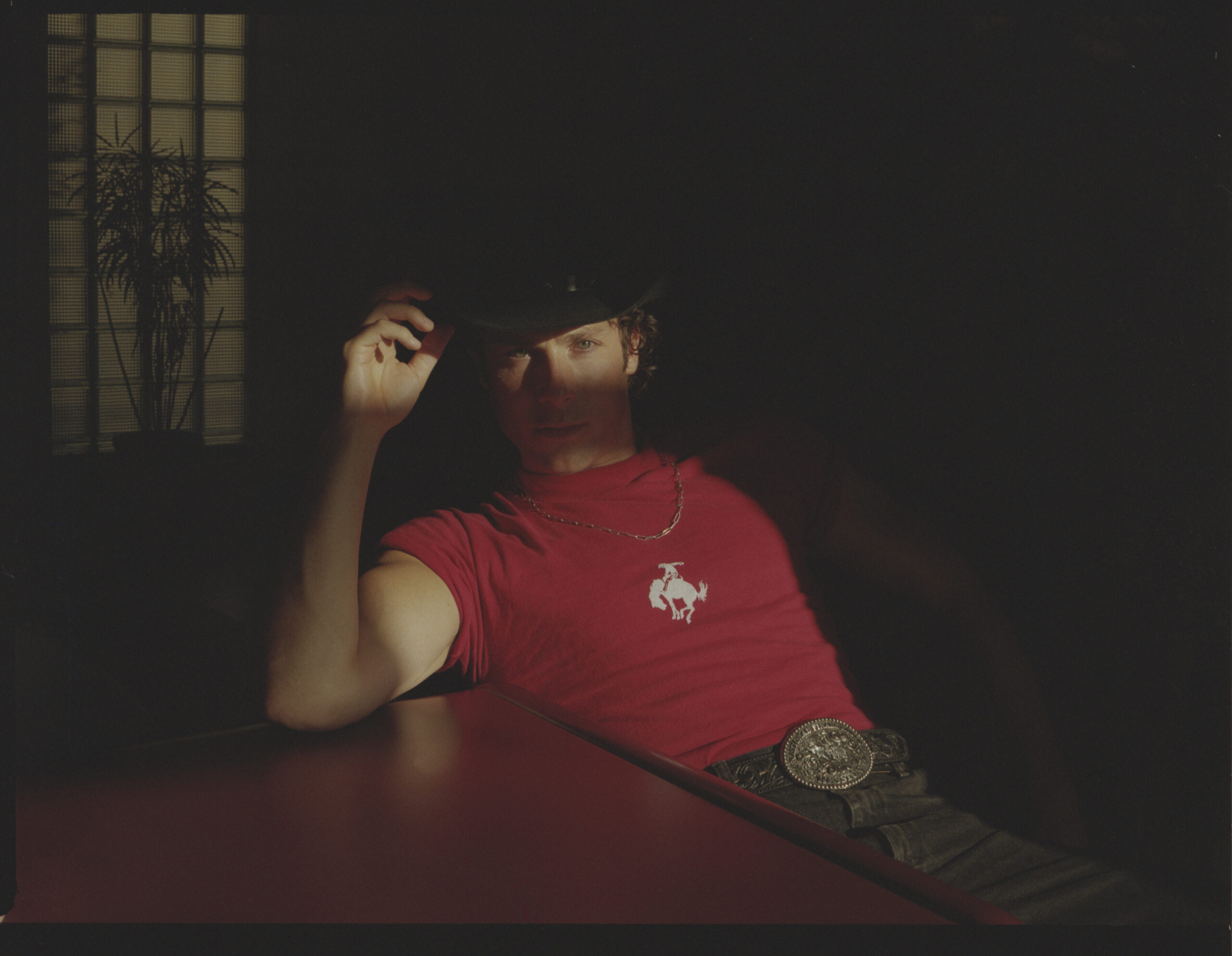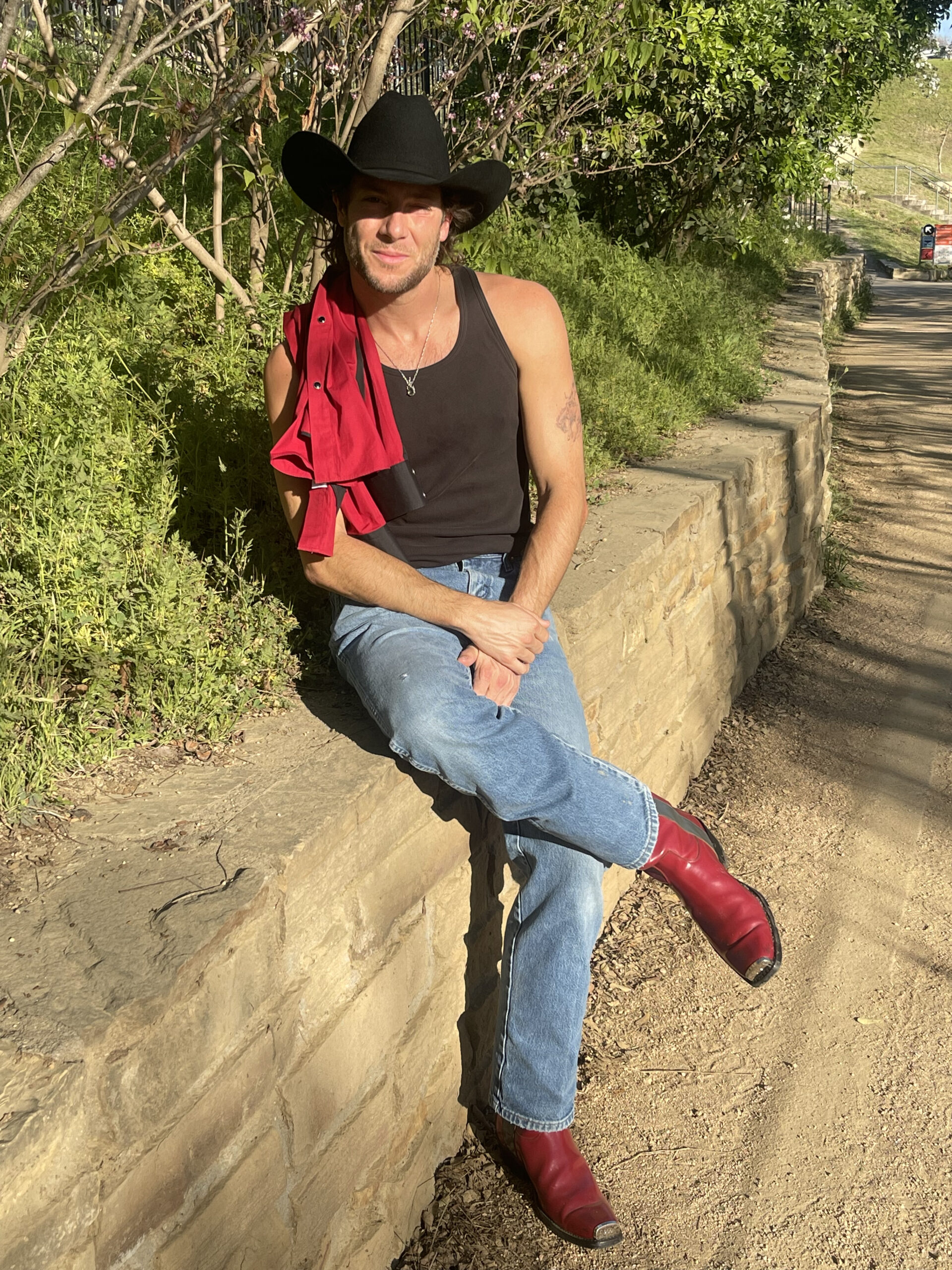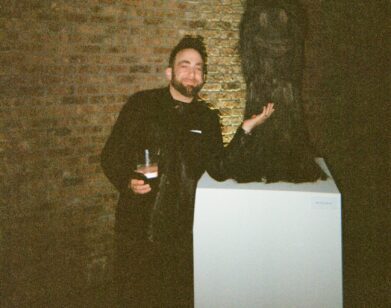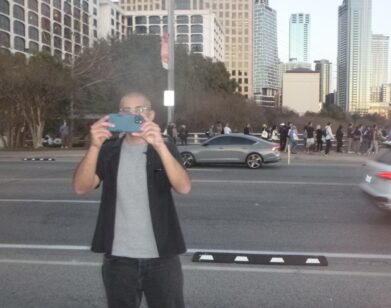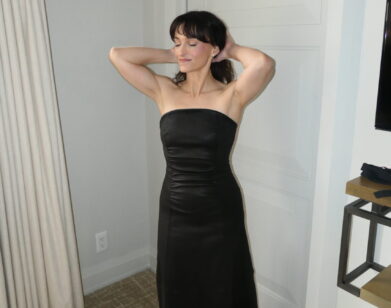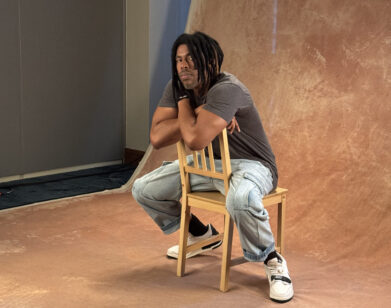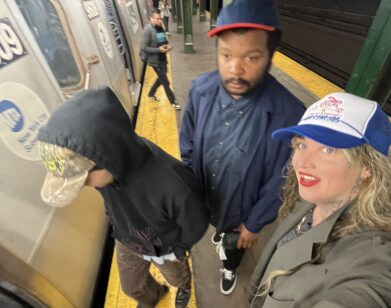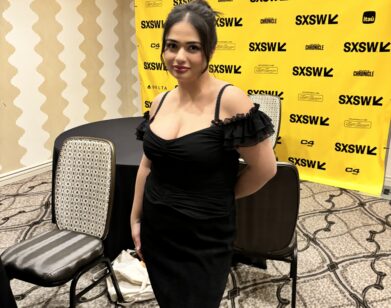SXSW
Luke Gilford Thinks SXSW is Giving Cowboys and Rough Trade
Set on a queer homestead in New Mexico, Luke Gilford’s directorial debut National Anthem follows Dylan, a cis ranch hand (Charlie Plummer) as he finds himself and falls in love with Sky (Eve Lindley), a trans cowgirl whose hunky boyfriend Pepe (Rene Rosado) runs the ranch. I loved the way the film navigates the awkward-but-sexy power dynamics of open relationships and threesomes—including two, tightly choreographed and dramatically essential sex scenes—in addition to its tender and dreamy representation of chosen family and queer intimacy in rural America. Known for his music videos, fashion and celebrity photography, and unique take on Americana, Gilford grew up watching his dad perform in mainstream rodeos before discovering the queer ones that took place around the Southwest in his late 20s. Last year, he released a photo book, also called National Anthem, archiving the portraits of country drag queens and gay rodeo stars he’s documented for seven years.
When I met up with Gilford at South By Southwest, he was dressed in his signature black cowboy hat and an envy-inducing pair of red Calvin Klein cowboy boots from the late-Raf era. “I love your cowboy hat,” a chipper white lady yelled, passing us on the North bank of the river downtown. Audiences in Austin were just as effusive, bringing Texas-sized cheers to this gorgeously crafted film, shot by cinematographer Kate Arizmendi and featuring original music by Perfume Genius. Days after the premiere of National Anthem, we got together to talk subverting cliched representations of queerness, what it’s like making a movie with your best friends, and, of course, Austin’s hot boys.
———
ZAK STONE: What’s Austin been giving?
LUKE GILFORD: I’ve been to Texas so much but never Austin, and it’s giving rough trade and cowboys. It’s hornier and more open—a lot hornier.
STONE: Hornier how?
GILFORD: This guy came up to me in the bathroom after the screening for Liza Mandelup’s new film Caterpillar, which is maybe my new favorite doc. He had come to National Anthem and started telling me his story of growing up in rural Utah and being Mormon.
STONE: So you were immediately like, “Hot.”
GILFORD: He had never been with a man before, so last night was his first queer experience.
STONE: Wow. Life imitates art! What else has been a highlight?
GILFORD: Being here with so many friends together was so fab. The week was so dreamy, everyone was so fun and not pretentious. There was nothing stressful about it, in the way things can be in LA and New York. It was pure joy, fun, and sexiness.
STONE: I know that collaborations with friends were a big part of getting this film made, and it seems like one of the things that viewers are picking up on in is the atmosphere of intimacy, especially in the group scenes of all the workers on the ranch, who are all queer, trans, and/or non-binary. Can you talk a bit about how you cultivated that vibe?
GILFORD: So much of it really had to do with my producer Ben Hannon Hubley. He’s a dear friend and he was living with me during pre-production and then during filming in New Mexico and California. Our friendship is about that kind of non-sexual, physical intimacy. In the pre-production process, we would invite the actors over to our house, and it was a process of peeling back those layers and showing them—not even talking about it, but just showing them—how powerful and beautiful and meaningful that can be. We tried to really translate that into scenes like the mushroom trip where physical touch was the spark for characters breaking down their walls, discovering themselves in a much deeper way than ever before.
STONE: I felt that in the relationship between Dylan and Sky. She comes on pretty strong and he’s more reserved. What kind of direction and guidance did you give them?
GILFORD: I spoke a lot in metaphor to Eve [Lindley], who was coming from New York City to New Mexico to play Sky. We talked about how urban queer communities can feel very cold, and I wanted Sky to feel warm and radiate sunshine. I think I helped her understand that Sky was literally melting Dylan, helping him defrost from his home life, which was so cold, you know? She disarmed him so he could discover these multitudes that he didn’t even know he contained.
STONE: You first started documenting the queer rodeo scene seven years ago, which is where you met the communities that inspired the stories in this film. What was that like?
GILFORD: I’m a huge Dolly Parton fan and I heard a song of her’s playing at a Pride event in Northern California. I was there with some friends and I literally left the group because I was pulled by the sound of her voice. There were some queer cowboys there and we immediately connected and they were so warm and welcoming to me. They invited me to go to New Mexico to that year’s championship rodeo. It was a very big one where a lot of people would be there and they were like, “You should come and meet everybody.” On a whim I decided to do it and found myself in New Mexico the very next weekend. It truly was the first time I’d ever felt an electric charge of belonging to something. No one ever asked me what I do or what my social media is or anything like that. It was so much more about connecting on a human level and being accepted into the family immediately just because I wanted to be there.
STONE: Did you meet people who lived in situations like the House of Splendor, the queer- and trans-run ranch where the film is set?
GILFORD: A lot of the folks in the queer rodeo community live in rural places, but they share properties. There are numerous chosen families where there are like, two dads and some kids and then they share cattle with like, two women and they have other land they farm. There are these homesteads built by different folks throughout the southwest. Also, after I graduated from UCLA, I immediately moved to Tennessee and lived in the backwoods of Tennessee with friends on part of a queer commune. That’s a totally different community than the rodeo world—it’s more like radical faeries—but it was also rural queerness.
STONE: I love the utopian vibe of the film, but I’m sure there are a lot of really tough things going on within these communities, too.
GILFORD: It was a huge goal of mine to craft a story that didn’t just immediately fall into cliches. So at every turn, as soon as you start to feel like you’re expecting something —an alcoholic mother, a kid in danger, or a three-way relationship— I wanted to move against what we’ve seen before. That was really important to create something that wasn’t just leaning on those cliches but authentically representing these spaces, which do exist. This isn’t just a fantasy world. I don’t think survival always has to be about violence and trauma. It can be about joy, too, and celebration and of course love. Of course, trauma and violence do exist. We all know that this is a scary fucking time. We’re in Texas right now. Over 70 anti-LGBTQ laws have been proposed this year alone. It’s a very scary time. Why do we need to see that on-screen all the time, though? Wouldn’t it be nice to have a little bit of utopia to give us hope, too?
STONE: One of the cliches that I thought you avoided in a really genius way was when you had a sex scene between Sky and Dylan. There was a moment when she asks him, “Do you know my deal?” and it seemed like she was about to initiate a conversation about gender identity before they fuck. But then as that conversation begins to unfold, it’s about none of that. It’s about the fact that she has a boyfriend, and what it would mean for her and Dylan to have sex in that context. I think that was my favorite part of the movie.
GILFORD: Hopefully, we’ll be in a future where we are all just viewed as people and aren’t tokenized or objectified so much for our identities. As someone who has been with trans people, I understand that many trans people don’t really want to talk about being trans all the time. I wanted to be sensitive to that. It is showing people through cinema that we can just accept people for who they are and not have to, like, make a big deal about it.
STONE: That also came up in a scene with Dylan’s younger brother, Cassidy, when he meets one of the House of Splendor members, Carrie, who is nonbinary. This moment seemed to be an audience favorite. Can you talk a bit more about it?
GILFORD: So when Cassidy meets Carrie he asks them, “Are you a boy or a girl?” in a very innocent way. And she just says “Neither,” and he’s, like “Cool.” No big deal. Like, that sort of matter-of-fact innocence in accepting people for who they are. I hope that that’s where we’re moving towards. Unfortunately, politically we’re not, but right now, that’s my hope and what I want to be putting out into the universe.

